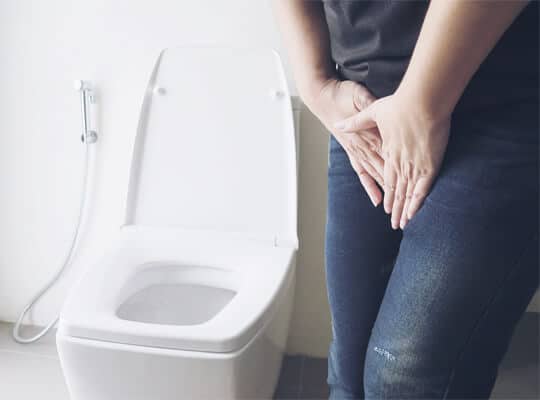Overactive Bladder
Table of Contents
Overactive bladder is something that unfortunately reduces the quality of human life. Although it is mostly seen over the age of 65, we see that this problem is also encountered at early ages. It is possible to regain your quality of life with a small operation or medication. You can feel yourself on holiday with 5-star service while receiving the treatmen on this subject in Northern Cyprus.
What is overactive bladder?
An overactive bladder problem is the need to urinate more often due to an uncontrolled urge to urinate. This problem, which negatively affects the quality of life of the person, causes incontinence and the necessity to urinate at night. Overactive bladder, which is usually seen in individuals over 65, can cause weakening of the bladder muscles and thinning of the pelvic floor tissue if left untreated.
Causes of overactive bladder
There can be many underlying causes of overactive bladder. These reasons are as follows;
- Nerve damage: Nerve damage due to herniated discs, back or pelvic surgery, stroke, Parkinson’s, Multiple Sclerosis can cause untimely urination signals to be sent to the brain.
- Abdominal trauma: As a result of weakening and stretching of the pelvic muscles after pregnancy, the lower abdominal organs are adversely affected. Depending on this situation, the muscles and tissues of the related organs may weaken.
- Infection: Urinary tract infections, which can irritate the bladder nerves, can cause bladder compression without warning.
- Alcohol, caffeine and drug use: Drinks that can cause the bladder to fill up quickly and leak, and some drugs adversely affect brain signals.
- Weight: Body weight causes increased pressure on the bladder. This may cause urinary incontinence.
- Estrogen deficiency: In premenopausal estrogen deficiency, a condition called urge incontinence may occur. This condition can only be resolved with vaginal estrogen therapy.
Symptoms of overactive bladder
The main symptoms of frequent urination problem can be listed as follows;
- Urinary urgency: It is the sudden and uncontrollable need for the toilet.
- Urinary incontinence: It is the incontinence of urine due to urinary urgency (urgency incontinence).
- Frequent urination: One feels the need to go to the toilet more often.
- Nocturia: The need to wake up to go to the toilet at least twice a night.
What behavioral changes can I make to help with overactive bladder?
In the treatment of overactive bladder problem, there are some behavioral changes that can make life easier for the person. These recommendations are;
- Keeping a bladder diary in which one can note when, how often and in what situation one needs to go to the toilet, taking into account eating and drinking habits, can help to understand the cause of the overactive bladder problem.
- The consumption of beverages such as tea, coffee, alcohol, fruit juice should be reduced.
- Fiber intake should be increased and regular exercise should be perfomed to maintain bowel order.
- For a healthy life, attention should be paid to weight control.
- In order to retrain the bladder muscles, the sense of urgency should be resisted and the need to go to the toilet should be delayed.

Medical and surgical treatments
Surgical interventions for the treatment of overactive bladder problem are applied to patients that had different unsuccessful treatments. The purpose of the surgeries is to reduce the pressure in the bladder and to expand the urine storage capacity of the bladder. In surgery to increase bladder capacity, certain parts of the intestine are used to replace a part of the bladder. Intermittent use of a catheter may be required after surgery.
Surgical removal of the bladder can be defined as creating a spare bladder surgically. The operation, in which the bladder is removed by attaching a bag to the skin, is performed to create a certain opening in the body. In this way, it is possible to collect the urine in a certain area.
Prescription drugs
There are some medications that can be used to relieve symptoms of overactive bladder and reduce urge incontinence. These drugs are Tolterodine, Ditropan XL, Trospium, Solifenasin, Fesoterodine, Mirabegron.
Nerve stimulation
Tibial nerve stimulation is a treatment that helps controlling bladder contractions fort he solution of the overactive bladder problem. With this method in which electrical signals are used, the number of people feeling the urge to urinate is reduced. In this way, it becomes possible to reduce urine leakage.
Percutaneous tibial nerve stimulation (PTNS)
Percutaneous tibial nerve stimulation is a non-surgical treatment for overactive bladders. In this method, a thin needle is inserted into the ankle where the tibial nerve is located, and when the nerve is stimulated, abnormal signals coming to the bladder are blocked. This method, which helps to prevent bladder spasms, acts on the nerve roots in the spine. The course of treatment is an average of 12 weeks.
Sacral neuromodulation (SNS)
Sacral Neuromodulation is the treatment of overactive bladder problem with pharmacotherapeutic methods for different indications such as urinary urgency frequency, urinary retention, fecal incontinence and urgent incontinence. SNS, which can help people with bowel and bladder problems, is used in the treatment of strong, frequent and sudden urination. With this application, bowel and bladder control can be adjusted with a device implanted under the skin of the pelvis on the hip. It is especially applied to patient groups who have not been successful despite trying methods such as drug therapy, diet, and behavioral changes.

Bladder reconstruction/urinary diversion surgery
A surgical procedure called neobladder reconstruction is used when the bladder no longer functions properly. With this method, after the bladder is removed from the body, a piece of intestine is taken to create a new bladder. With the new bladder created, it becomes possible for the person to control urination. The reasons for choosing the application are as follows;
- Bladder trauma
- Bladder no longer functioning properly due to neurological diseases or radiation therapy
- Bladders that do not respond to different treatments
- Urinary incontinence
• Bladder cancer - Urinary incontinence due to weakening of the bladder muscles as a result of pregnancy
- Loss of bladder functionality due to chronic inflammatory diseases
For More Information
Please do not hesitate to contact us for more information on the subject.



